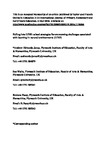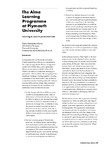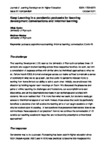Falling into LINE: school strategies for overcoming challenges associated with learning in natural environments (LINE)
| dc.contributor.author | Edwards-Jones, A | |
| dc.contributor.author | Waite, S | |
| dc.contributor.author | Passy, R | |
| dc.date.accessioned | 2016-06-11T11:55:36Z | |
| dc.date.available | 2016-06-11T11:55:36Z | |
| dc.date.issued | 2018-01-02 | |
| dc.identifier.issn | 0300-4279 | |
| dc.identifier.issn | 1475-7575 | |
| dc.identifier.uri | http://hdl.handle.net/10026.1/4886 | |
| dc.description | peerreview_statement: The publishing and review policy for this title is described in its Aims & Scope. aims_and_scope_url: http://www.tandfonline.com/action/journalInformation?show=aimsScope&journalCode=rett20 | |
| dc.description.abstract |
As the benefits of outdoor learning have become of increasing interest to the education sector, so the importance of understanding and overcoming challenges associated with this pedagogy has gained greater significance. The Natural Connections Demonstration Project recruited primary, secondary, and special schools across south-west England with a view to stimulating and supporting ‘learning in the natural environment’ across the region. This research paper examines qualitative data obtained from case study visits to 12 of these schools. The results from teaching staff interviews and focus groups show that schools face many and varied challenges to embedding outdoor learning, and a raft of strategies are presented for tackling these challenges and integrating learning in the natural environment into much of the current curriculum. | |
| dc.format.extent | 49-63 | |
| dc.language | en | |
| dc.language.iso | en | |
| dc.publisher | Taylor & Francis (Routledge) | |
| dc.subject | Outdoor learning | |
| dc.subject | learning in the natural environment | |
| dc.subject | learning outside the classroom | |
| dc.subject | barriers | |
| dc.subject | natural connections | |
| dc.subject | curriculum learning | |
| dc.subject | school grounds | |
| dc.title | Falling into LINE: school strategies for overcoming challenges associated with learning in natural environments (LINE) | |
| dc.type | journal-article | |
| dc.type | Article | |
| plymouth.issue | 1 | |
| plymouth.volume | 46 | |
| plymouth.publication-status | Published | |
| plymouth.journal | Education 3-13 | |
| dc.identifier.doi | 10.1080/03004279.2016.1176066 | |
| plymouth.organisational-group | /Plymouth | |
| plymouth.organisational-group | /Plymouth/Faculty of Arts, Humanities and Business | |
| plymouth.organisational-group | /Plymouth/Faculty of Arts, Humanities and Business/Plymouth Institute of Education | |
| plymouth.organisational-group | /Plymouth/PS - Doctoral College | |
| plymouth.organisational-group | /Plymouth/REF 2021 Researchers by UoA | |
| plymouth.organisational-group | /Plymouth/REF 2021 Researchers by UoA/UoA23 Education | |
| plymouth.organisational-group | /Plymouth/Research Groups | |
| plymouth.organisational-group | /Plymouth/Research Groups/Institute of Health and Community | |
| plymouth.organisational-group | /Plymouth/Users by role | |
| plymouth.organisational-group | /Plymouth/Users by role/Academics | |
| dcterms.dateAccepted | 2016-04-02 | |
| dc.rights.embargodate | 2017-11-6 | |
| dc.identifier.eissn | 1475-7575 | |
| dc.rights.embargoperiod | 18 months | |
| rioxxterms.versionofrecord | 10.1080/03004279.2016.1176066 | |
| rioxxterms.licenseref.uri | http://www.rioxx.net/licenses/under-embargo-all-rights-reserved | |
| rioxxterms.licenseref.startdate | 2018-01-02 | |
| rioxxterms.type | Journal Article/Review |




